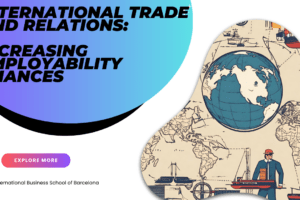
Navigating Global Challenges: A Guide to International Business and Relations
- Categories International Relations & Business

International Business and Relations Guide
In today’s interconnected world, understanding the intricacies of international business and relations is more crucial than ever. As we navigate global challenges, from economic shifts to political unrest, this guide offers insights and strategies to help professionals and students alike excel in a dynamic global market. Here at ESEI International Business School of Barcelona, we’re committed to providing the tools and knowledge necessary to thrive in international environments.
Understanding the Landscape of International Business
Globalization and its Impact on Business
Globalization has permanently altered the landscape of how businesses operate, allowing for unprecedented growth and connectivity but also introducing new challenges. As markets become increasingly interlinked, companies must adapt to a variety of economic, political, and social climates. Businesses can leverage globalization by entering new markets and diversifying their products and services to meet a broader range of customer needs. However, it’s also crucial to be aware of the risks associated with globalization, such as over-dependence on foreign markets or exposure to foreign economic instability.
To effectively navigate these waters, businesses must adopt robust strategies that incorporate local and global market trends. ESEI International Business School offers courses and seminars dedicated to global market strategies, designed to help professionals understand these dynamics thoroughly.
The Role of Cultural Awareness in International Relations
In the realm of international business, cultural competence is not just beneficial; it is essential for success. Understanding and respecting cultural differences is vital in overcoming global challenges, enhancing negotiations, and fostering strong international partnerships. Cultural sensitivity helps in identifying and respecting local business practices, communication styles, and negotiation techniques, which differ significantly across cultures.
At ESEI, we emphasize the development of cultural competence through our multicultural environment and specialized courses on international relations and cultural diversity. This training helps our students and stakeholders forge enduring relationships that respect cultural boundaries and values.
Strategies for Overcoming International Business Challenges
Adapting to Economic Volatility
International markets are inherently dynamic, often susceptible to rapid economic changes such as fluctuations in exchange rates, political instability, and changes in trade regulations. To maintain stability in these unpredictable environments, businesses must develop strategies that promote resilience and adaptability.
Key strategies include diversifying supply chains to avoid reliance on a single country or market, implementing flexible business models that can adapt to changing economic conditions, and investing in financial risk management tools. Additionally, staying informed about global economic trends is crucial for preemptive planning. ESEI International Business School offers executive training programs focused on global economic trends and risk management that equip professionals with the necessary skills to anticipate and react to economic volatility effectively.
For a deeper dive into managing economic volatility, consider exploring these resources:
- McKinsey & Company’s insights on navigating economic cycles
- Financial Times’ analysis of global economic trends
Legal and Ethical Considerations
Navigating the complex web of international laws and regulations is paramount for any business operating across borders. Understanding the legal landscapes and ethical considerations is essential for conducting international business responsibly and sustainably.
This involves not only adhering to international trade laws and regulations but also engaging in ethical practices that respect human rights and labor laws. Businesses must be vigilant about compliance issues, which can vary significantly between countries. At ESEI, our programs include modules on international business law and ethics, helping students and professionals understand and navigate these complexities effectively.
Building Sustainable International Relations
Creating Long-Lasting Partnerships
Sustainable relationships are the cornerstone of successful international business. Building and maintaining strong connections with international stakeholders requires a focus on trust, transparency, and mutual benefits. At ESEI International Business School, we emphasize the importance of ethical business practices and effective communication skills, which are key to developing these relationships.
Key approaches include regular communication, cultural sensitivity, and aligning business objectives to ensure that all parties benefit equitably. Networking events, international conferences, and trade missions are practical platforms for fostering these relationships. ESEI offers various networking opportunities through our global alumni network and partnerships with international businesses and organizations.
For further insights into creating successful international partnerships, consider these resources:
- Harvard Business Review on Building Sustainable Business Relationships
- International Chamber of Commerce, which offers guidelines on international business collaboration
Innovation and Collaboration Across Borders
In the global marketplace, innovation is crucial for solving challenges and maintaining competitiveness. International collaboration facilitates the exchange of ideas, technology, and best practices, driving innovation across various industries. Successful examples include multinational technology firms and global pharmaceutical companies that collaborate on research and development to bring new products and services to the market faster.
ESEI’s courses on international business strategy and innovation management provide students with the knowledge and tools to engage effectively in these collaborative ventures. We also highlight case studies and success stories from global companies that exemplify the benefits of cross-border collaborations.
To explore more about innovation through international collaboration, the following resources are invaluable:
By understanding the dynamics of international partnerships and collaborative innovation, businesses can enhance their global presence and impact. ESEI is dedicated to preparing students and professionals to lead in these areas, equipped with the necessary skills and insights to succeed.
Navigating global challenges in international business and relations requires a robust understanding of the global market, keen cultural insights, and strong strategic planning. At ESEI International Business School of Barcelona, we equip our students with the skills and knowledge needed to excel in this dynamic field, preparing them for successful careers on the international stage.
Ready to become a leader in international business? Join us at ESEI International Business School of Barcelona to start your journey towards mastering international business and relations. Explore our programmes and find out how you can start making a global impact today!



